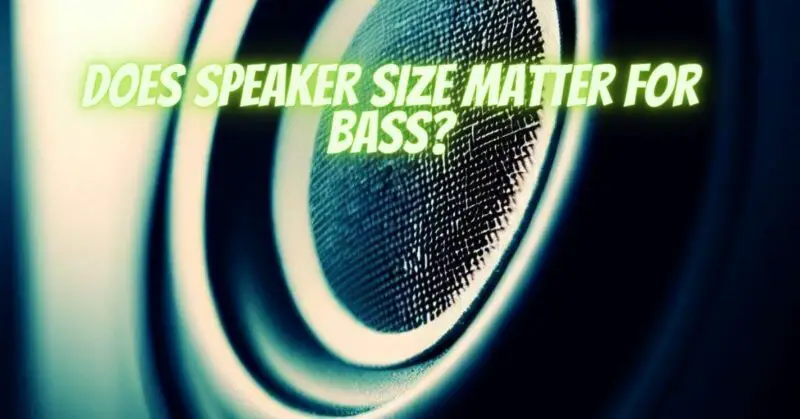Yes, speaker size does matter for bass. Larger speakers can produce lower frequencies than smaller speakers. This is because the cone of a speaker needs to be able to move a certain amount of air in order to produce low frequencies. A larger cone can move more air than a smaller cone, which allows it to produce lower frequencies.
How does speaker size affect bass?
The size of a speaker affects the wavelength of the sound waves that it can produce. The wavelength of a sound wave is the distance between two consecutive peaks of the wave. The lower the frequency of a sound wave, the longer its wavelength.
A larger speaker can produce sound waves with longer wavelengths than a smaller speaker. This is because the cone of a larger speaker has a greater surface area, which allows it to move more air.
How to choose the right speaker size for bass
If you are looking for speakers that can produce deep bass, you will need to choose speakers that are large enough. The size of the speaker that you need will depend on the type of music you listen to and the size of the room that you will be using the speakers in.
If you listen to a lot of music with deep bass, such as hip hop or electronic music, you will need speakers that are at least 12 inches in diameter. If you only listen to music with moderate bass, such as rock or pop music, you can get away with speakers that are 8 or 10 inches in diameter.
Speaker size and other factors
In addition to speaker size, there are other factors that can affect the bass response of a speaker. These factors include the type of speaker, the materials used in the speaker, and the design of the speaker cabinet.
Type of speaker
There are two main types of speakers: dynamic speakers and planar speakers. Dynamic speakers are the most common type of speaker. They have a cone that moves back and forth to produce sound waves. Planar speakers have a flat diaphragm that moves up and down to produce sound waves.
Planar speakers can produce deeper bass than dynamic speakers. This is because the flat diaphragm of a planar speaker can move more air than the cone of a dynamic speaker.
Materials used in the speaker
The materials used in the speaker can also affect the bass response. Speakers that are made with heavier materials, such as paper or metal, can produce deeper bass than speakers that are made with lighter materials, such as plastic.
Speaker cabinet design
The design of the speaker cabinet can also affect the bass response. Speakers that are enclosed in a ported cabinet can produce deeper bass than speakers that are enclosed in a sealed cabinet.
A ported cabinet has a hole in the back that allows air to move in and out of the cabinet. This helps to amplify the bass frequencies. A sealed cabinet does not have a hole in the back. This helps to prevent the bass frequencies from being lost.
Conclusion
Speaker size does matter for bass. Larger speakers can produce lower frequencies than smaller speakers. If you are looking for speakers that can produce deep bass, you will need to choose speakers that are large enough. The size of the speaker that you need will depend on the type of music you listen to and the size of the room that you will be using the speakers in.


